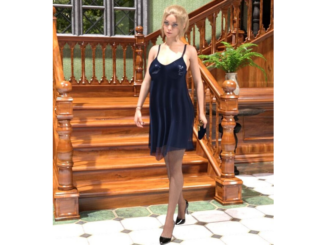We will kill desire: we will foster drunkenness, gossip, denunciation; we will foster unheard-of depravity; we will stifle every genius in its infancy. Everything reduced to a common denominator, complete equality.
Dostoyevsky
Rodion opened his eyes and sat up on his filthy mattress. Something felt wrong, but he could not define what. It seemed earlier than usual; Rodion rarely got up before noon. Despite the ancient fan-heater, the room was cold and damp, but that was not new. The squat where he and his Antifart friends holed up was squalid, and here I am mincing words. Rodion got up and flicked on the blackened kettle which sat on a piece of tattered carpet in a corner of his room, then proceeded to roll himself a cigarette but could not find his lighter anywhere. His pockets were full of holes; it must have fallen out somewhere yesterday. They had been out all afternoon beating up fascists in Leicester Square, not that Rodion, whose schooling had been patchy to say the least, had any idea what constituted a fascist. To him, it was just a bit of harmless fun and it passed the time. Rodion had never worked. Time was something he had too much of; and that bothered him.
There was no kitchen now in the house. A hippy couple lived down there, and it pleased Rodion immensely that their accommodation was slightly worse than his own. Voices, lots of them, droned on from Tarquin’s room down the hallway. It sounded to Rodion as if for some strange reasons they were all whispering. Everyone tended to shout in the squat. Perhaps, that was what had felt so wrong just a minute ago. One of them was bound to have matches, he thought. They smoked cannabis all day, unlike Rodion who was allergic and had always kept well away from it as it made it choke and pass out. Whenever he saw the state his friends were in at the end of the day, he thought to himself that his allergy may well be a blessing in disguise.
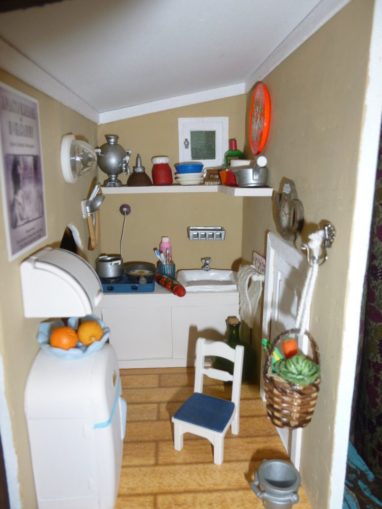
Rodion awkwardly put on yesterday’s jeans and hooded sweat-shirt. He was extremely tall and thin, with the unhealthy pallor that comes from malnutrition. His diet of crisps, chocolate and plenty of ketchup could have sprung straight out of that world famous cookbook, Al Junior’s Deplorable Recipes For Far-Right Nazi Racists (Available from all good bookshops). To top it all, Rodion’s eyesight was very poor, but in the sort of environment where he had been raised (if I can call it that; “ignored” would be a better term) it had not been noticed. Let me tell you a secret: the red plastic lighter was staring at Rodion just this instant, lying on top of a scarred apple crate full of junk and dirty clothes. I am sure that my beloved readers will have guessed by now that my hero, though barely twenty-one years of age, was not exactly a prize bachelor high society debutantes would fight tooth and nails over. In fact, though I despise Newspeak, poor Rodion could well have been called an incel.
By now desperate for his first cigarette of the day, Rodion got out of his room and walked lazily towards Tarquin’s room. The voices were getting louder as if no fewer than ten people were crammed inside. Tarquin had allocated himself the largest and least awful room in the squat; still, that many people would not fit easily in that cramped space. A woman with a posh voice, which to Rodion’s unemployed class ears sounded like crushed glass, started speaking. Because he was nearly blind without the glasses he had never had, Rodion had unwittingly developed an acute sense of hearing. He froze suddenly for, though she talked in low tones, he was sure she had said the word “bomb.” He braced up and tiptoed to the door. Holding his breath, he listened.
“We should get your thick mate Rodion to carry it,” the woman said. “He’ll never guess we’re using him.”
“He’s useless, Philippa,” guffawed Tarquin. “He’ll blow himself up.”
“So what?” The posh woman replied. “Terror is what we mean to achieve. No one will miss such an ugly moron, and hopefully he won’t be identified, so we can keep on drawing his unemployment benefit indefinitely.”
Rodion did not wait to hear more. Noiselessly, he retreated to his room and vainly attempted to shut himself in. The locks had fallen out long ago.
“Get out of here!” He said to himself and hastily started packing.
Though he had accumulated quite a lot over the years, he realised that there was in fact very little he wished to take with him. Looking around his room, at the peeling wallpaper, at the mangy carpet, at his dirty and broken possessions, he felt a wave of disgust in his constricted throat. His entire mind and body rejected the life he had led since leaving school as if it were poison.
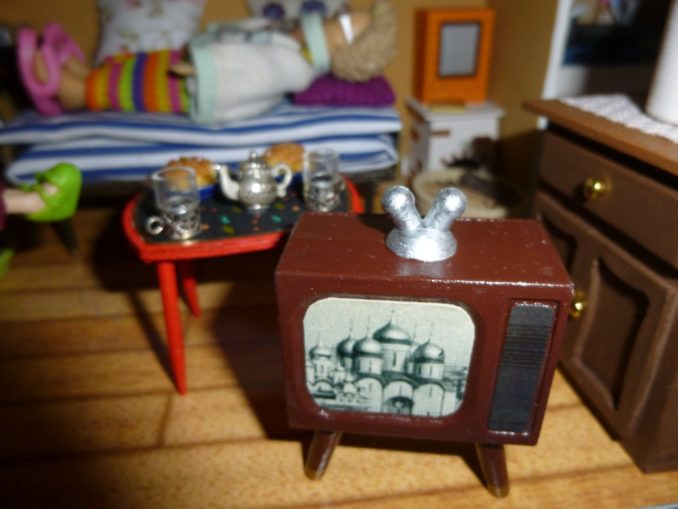
Five short minutes later, Rodion stood on the Underground platform not knowing where he wished to go. He hopped on a train and got off two stops later. Again he stood on the platform thinking. He had no one in the world. He had never known his father. Sally, his mother, was in a permanent vegetative state following her latest heroin overdose. His half brothers and sisters, so many he had lost count, were all in care, or gaol. Audrey, his real or whole sister, Rodion was not sure what the word was, had never been able to stand the chaos at home. She had left as soon as she legally could and taken a job at a chippy, living a quiet, orderly life in a small room above a sweets shop. Eight months ago she had married a mechanic from a similar background and with the same worldview. They refused to live in a council flat; instead they had bought an old canal barge which they kept impeccably clean and tidy. They associated only with like-minded neighbours and colleagues. Rodion’s brother-in-law had told him in no uncertain terms the last time they had met that, unless he turned his life around permanently, they did not want him anywhere near them.
As another Tube train approached, tears rose in Rodion’s eyes: he had always admired Audrey. It was then that, for a reason he could not fathom until months later, he remembered Sonya whom he had met at a party once. She had been brought there by a friend, looked obviously ill-at-ease and left on her own after a little while. What had impressed Rodion was Sonya’s cleanliness. Yes, he thought as he stood on the platform, everything about Sonya was clean. He had been told, by whom he now could not remember, that her mother was an alcoholic who not long ago had died of liver cirrhosis and that she had been abused by a string of stepfathers, but still, Sonya was clean, soft spoken, nicely turned out and probably house-proud as well. When the doors slid open, Rodion jumped into the Tube train when less than a minute before he had considered throwing himself under it.
Sonya was not at home. After he had rung the doorbell twice, Rodion remembered that she worked, doing what he did not know. He sat on his rucksack in the hallway and waited. He must have fallen asleep for the sound of the lift coming up jolted him awake. Looking at his watch he saw that it was already nearly four o’clock. The lift doors slid open, Sonya stepped out and, upon beholding Rodion, froze.
“What are you doing here?” she asked frostily.
“I’ve been waiting for you,” answered Rodion truthfully. “Do you remember me?”
“Yes, I do. Your name’s Rodion, isn’t it?”
“That”s right,” said Rodion. “Can I come in? There’s something I need to ask you.”
“If it’s about joining Antifart, I’m not interested.” stated Sonya with steel determination.
“It’s not about that,” said Rodion. “In fact, I’m not with them anymore.”
Sonya unlocked her front door and led Rodion through a tiny hallway into the living room. As Rodion had guessed, though simple and small, it was tidy and even cheerful. For a reason he was to understand many years later, Rodion, who had lied his way through his short life, told Sonya the truth and nothing but the truth. When he had finished, Sonya nodded and said:
“Alright, you can stay here, but there’re strict rules in this house. If you don’t like them, leave now and never come back. First, there’s no question of you sharing my bed. I don’t know you. I’ve a small rolled up mattress and a spare duvet in the cupboard. You can use that and sleep in the kitchen. Secondly, I expect you to get a job and pay your way while you live here. Third, I live a clean, orderly life and intend to keep that way. I don’ want any of your Antifart friends here, I don’t like dirt and mess and I start work at seven in the morning, so I go to bed early. Four, I want no drugs in this house. You can smoke cigarettes if you empty and wash the ashtray afterwards.”
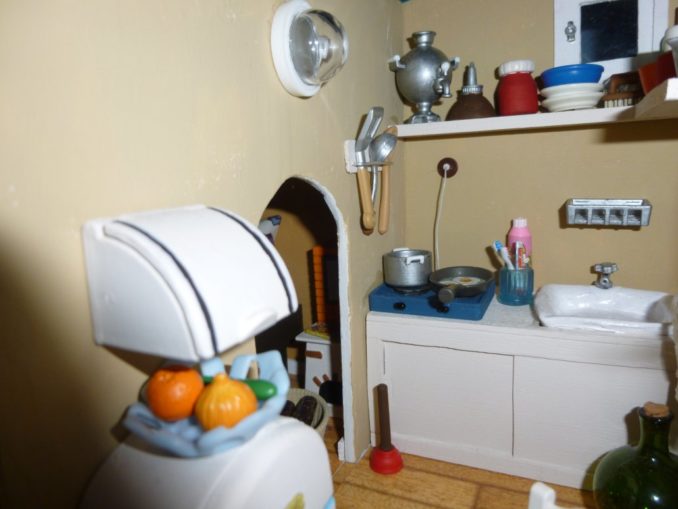
“I’ll start looking for a job tomorrow,” promised Rodion, “and as I told you I never want to see my Antifart friends ever again. They were never friends to begin with, as I found out this morning. Can I take a shower?”
“Yes, I think you ought to,” said Sonya. “I’ll give you a towel, and please, change into clean clothes once you’re done. If you don’t mind my saying so, what you’re wearing now is full of stains.”
“I don’t have anything clean,” mumbled Rodion, blushing.
“Then give me everything. I’ll take it to the launderette while you’re showering.”
When Sonya returned carrying a plastic hamper full of dry clean clothes, Rodion was sitting in the armchair wearing a pink terrycloth bathrobe much too small for him which he’d found hanging on a peg in the bathroom. Sonya burst out laughing then proceeded to make omelette and a salad for tea.
The following day, Rodion went out early and before eleven had secured a job stacking shelves at a nearby supermarket. As the supervisor showed him what his work would consist in, Rodion realised that he would never be able to do anything with his poor eyesight, so before starting his shift the next morning, he went into a pharmacy and bought a pair of plastic reading spectacles.
To his own amazement Rodion found his new life enjoyable. His colleagues were friendly, particularly Jason, a black man who was a Bible teacher in his spare time. Rodion admired Jason, twice his age, kind, wise and extraordinarily learned. On Friday after work, a group of them went to a nearby pub and talked over the week gone by over a pint. With his first pay check, Rodion bought a wooden screen from a junk shop to keep his sleeping area private from the rest of the kitchen.
Surprisingly enough, Sonya and Rodion got along quite well. She only ate simple but wholesome home cooked food. After a mere two weeks, Rodion had gained much needed weight and felt healthier and stronger. When they ate pasta, she made her own tomato sauce and grated cheese herself, which Rodion had never known was possible. In the evening, Sonya crocheted which, she said, she had been taught as a child by Nanna Lowrie, a kindly elderly neighbour who was a retired domestic servant. Sonya made her own woolly jumpers, mufflers and even soft, warm slippers for the winter, which allowed her to be nicely dressed without having to spend very much. She bought bags of cast-off yarn from charity shops.
Leaving work one muggy evening, Rodion found an old record-player in a skip. When he tried it at home, he discovered that it was in perfect working order, so he started buying old vinyls to which they listened in the evening. Once, he found a bagful of classical records in a wheelie-bin on the street and kept those too.
Sonya worked as a cleaner at an Anglican Church barely ten minutes from home. The church had a small children’s library with low bookcases against the walls and tiny round tables with matching chairs. Sonya loved cleaning that room on account of the colourful drawings tacked to the walls. She normally left work at three o’clock, but one day, the vicar’s wife asked her to stay until four in order to prepare the little library where a children’s party was due to start at five. A large picture book had been left open on one of the tiny tables. Sonya was about to close it and put it back in the bookcase when her eyes fell upon an illustration the like of which she had never seen: an elderly man in a long gown herding a crocodile of diverse animals into a kind of ferry. British state education being what it is, after ten years spent in school, poor Sonya was functionally illiterate. Still, the picture intrigued her so much that, at the end of her shift, she timidly asked her boss if she could borrow the book.
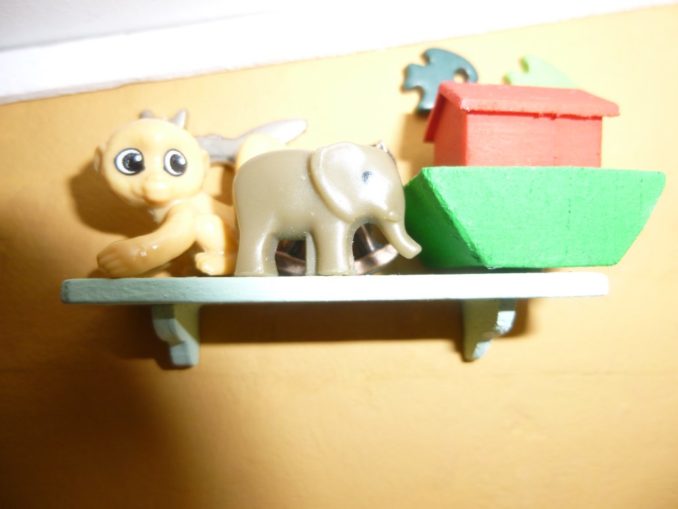
“Please, do, Sonya,” enthused the vicar. “It’s one of our best; you’ll love it.”
Rodion was not due back until half past seven. Sonya painfully tried to read the story. All she could make out was the elderly man’s name, Noah, and that it had rained heavily for forty days. From this she deduced that Noah put the animals on the ferry so as to save them from drowning and, perhaps take them somewhere safe. She loved Noah for getting the idea and loved the picture of all the happy-looking animals on board the ferry even more.
When Rodion came home, he found Sonya sitting on her sofa-bed still trying to decipher the story. He sat next to her, which he normally never allowed himself, and gently took the book from her. Rodion’s reading skills were not much superior to Sonya’s, but he wanted to impress her, so he concentrated very hard and, to his own surprise, was able to make practically everything out.
“You see, Sonya,” he said, “it never stopped raining for forty days, so the earth was covered in water and everyone was going to drown, so Bod, I suppose he’s an old chap like Noah, came round and told him to build an ark, I don’t know what that word means, I suppose it’s the name of the houseboat, and put all the animals inside so they wouldn’t drown.
Sonya peeked at the text.
“It’s a G, Rodion, not a B. He’s not an old chap, He’s God.”
“Is he like a friend of Noah’s?” Asked Rodion.
“No,” answered Sonya. “God is God; He’s not a man young or old, nor a friend. If you’re interested, you’ll have to ask my boss the vicar. He knows about clever things like that.”
“And were Noah and the animals saved?” She asked after a pause.
“Yes,” said Rodion. “It stopped raining, there was this huge rainbow, and when the ground was dry again they all came out.”
Sonya gave a sigh of relief.
“Were you worried about the animals?” inquired Rodion.

“Not just the animals,” said Sonya. “I don’t know why but I really like Noah.”
“You know,” said Rodion, “there’s something strange about this story: it seems everyone was married. It says here that Noah gets on the boat with his wife and their three sons; and they must be grown-up because they also have wives, one each, I mean. I’ve never known anyone who was married; have you?”
Sonya thought for a minute.
“I can’t say I have,” she said, shaking her head. “My parents weren’t, that for sure. My boss is married, but maybe that’s because he’s a vicar, and Nanna Lowrie told me she was a widow. Does that mean she’d been married?”
“I think it does,” said Rodion leafing forwards a few pages until his eyes came to rest on another illustration.
“Eh, look at that!” he exclaimed. “I can’t believe those people crossing the sea on foot. What a great book this is!”
“Please, Rodion,” Sonya begged, “do read that story, too.”
Rodion was only too happy too comply.
“You see, Sonya, those people were slaves in Egypt, not that I know what that is.”
“It’s a country, Rodion,” interrupted Sonya. “It’s where they have all the pyramids and the Sphinx, I think, as well.”
“Right,” said Rodion and resumed his reading. “Those people were called the Children of Israel. I suppose that’s a country too?”
“I know about Israel,” said Sonya. “My boss goes there all the time.”
“It must be really nice, then.”
“I’m sure it is,” answered Sonya, “but he goes there because that’s where Jesus was born.”
Rodion, who had never heard of Jesus, went on reading as best he could.
“So, this time, God told this old chap Moses to take the Children of Israel out of Egypt; but when they reached the Red Sea they couldn’t cross over and the Egyptians were following behind really fast trying to catch them. Nasty people those Egyptians, if you ask me.”
“Couldn’t they borrow Noah’s ferry?” inquired Sonya.
“He wasn’t there at the time,” elaborated Rodion.
“So, what did they do?” asked Sonya impatiently. “Were they caught?”
“No,” said Rodion mysteriously. “That’s the whole beauty of it. Moses stretched his hand and the water parted so they could all cross on foot, the whole lot of them, even the little kiddies, and when they got to the other side, which was Israel, Moses stretched his hand again and the Egyptian army drowned, every last one of them.”
Sonya, who had been holding her breath until then, let it out.
“And were they free in Israel?” She asked.
“That was the whole point of going there,” answered Rodion. “It was their own country; they’d never be slaves there. And you know what? Moses was also married. It seems that they all were, I don’t know why.”
For nearly six weeks after that, Sonya spent every evening deciphering Noah’s story until, one day, she realised she was able to read fluently. She then read the whole book and enjoyed it so much that she reread it three times. When she returned the book, with a heavy heart I must add, she told the vicar in all sincerity that she had absolutely loved it. Needless to say, the reverend was over the Moon and only too happy to recommend more books to his young employee. Sonya went home that afternoon with Lamb’s Tales From Shakespeare and Oliver Twist.
In the meantime, Rodion was also secretly improving his reading skills thanks to his colleague Jason who had kindly offered to help. For some reason, Rodion had felt no shame to tell Jason about his quasi illiteracy. Because Jason was a Bible teacher, he at first set Rodion easy Biblical verses to read then more difficult ones later on.
One afternoon, Sonya saw a plastic toy boat in a charity shop window and went inside to buy it. As an afterthought, she also picked two small animal figurines, a lion and a tiger, one made of resin, the other of porcelain. Once home, she laid her ark on top of the chest of drawers on a sky blue doily with the animals behind. From then on, she started collecting small animal figurines. Every time she brought a new one home, she stood it behind the boat until she had a motley line of different creatures made of every material one can think of. For her birthday and to her utmost delight, Rodion gave her a small statue of Merlin which to him looked like Noah.
A few months later, it was now near Christmas, Rodion, whose shift at the supermarket had started very early, came home before Sonya and found a letter addressed to her on the mat. To him, who had never sent or received a letter in his short life, this seemed an extraordinary event. He placed the letter on the coffee table then went to sit on his mattress in the kitchen and practise his reading. Marriage had been much on Rodion’s mind lately, probably because he found that institution unfathomable, and he worried lest the letter contain a proposal even though Sonya, who was rather isolated and seldom went out, had never mentioned a suitor.
“Oh, it’s from my Dad!” exclaimed Sonya ecstatically when she slit the letter open an hour later.
“Which one?” asked Rodion.
“My real Dad,” Sonya explained, “Simon Marmeladov. The others were fakes, just my Mum’s boyfriends, really.”
“He’s got the same name as you,” said Rodion.
“Of course, he does!” shrugged Sonya. “He’s my father, silly.”
“What does he write?” enquired Rodion worriedly.
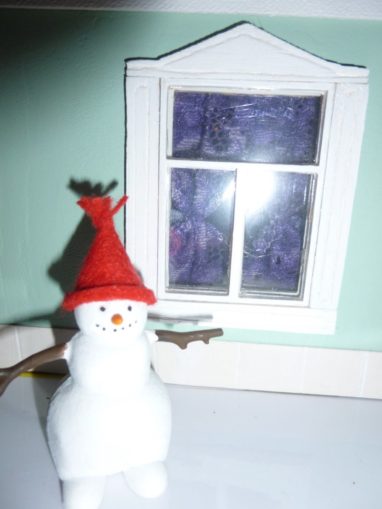
“Here, I’ll read it out loud,” Sonya offered.
“My dearest Sonya,
I was released from prison for the fourteenth time six months ago and decided I never wanted to see the inside of a cell again. You know I’m not clever, but still, I realised that to avoid doing jail time again I needed to change my ways and turn my life around completely. So I stopped drinking and found a job washing dishes at a pub here in Exeter. I must say my boss Roger help me a lot. Like me, he’s an ex-alcoholic who lost his family as a result. He showed me the errors of my way. I’m sure you’ll like him when you meet him.
I’m now 43. When you were born, I was an irresponsible young sod. I don’t want to be an irresponsible old sod as well. I hate myself for not marrying your Mum when she, or rather I, got her pregnant with you and sticking to the two of you, come what may. I know she’s dead and blame myself for it, though people will say she too made choices.
Instead of doing my duty, I got into trouble, that is made a lot of trouble for people I didn’t even know, and was arrested once again. In my books as they are now, you can’t do worse than that.
I live in a room above the bar and spend my free time time reading. I don’t go out much; best way to avoid trouble if you ask me. A few months ago, I happened upon an adventure story by Homer and liked it so much that I now only read Greek literature which is so full of common sense and wisdom. Those people knew human nature like no one does today! I’d love to learn Greek and maybe one day visit Greece even.
I very much want to make it up to you and look after you though everyone says I left it a bit late as you’re old enough to take care of yourself now and perhaps you want nothing to do with your old sod of a father. This place is a big sprawling Victorian building and if you like Roger could give you a really nice room near my own. He also lives here in a flat, so you wouldn’t be alone with just your Old Man.
I don’t have a mobile phone as they’re the first step on the road to perdition, but if you call the bar (I’ll write the number at the bottom), I’m there every evening from six o’clock.
Your loving Dad,
Simon Marmeladov”
“What are you going to do?” asked Rodion anxiously the minute Sonya had finished reading.
“Call my Dad, of course,” said Sonya, taking her mobile phone out of her handbag.
When three weeks later Sonya announced that she was moving to Exeter where she had spent a weekend with her father and Roger, and had found a job through her boss whose brother-in-law was also a vicar in Exeter, Rodion fell into a deep depression even though Sonya thoughtfully offered to call the Council so as to transfer the flat to him.
At the pub on Friday evening, Rodion’s colleagues, who could not help but notice how gloomy he had been lately, mustered their courage and asked what was wrong with him. Despite his introverted nature, Rodion had been dying to unburden his soul. He explained the situation briefly, then concluded with these words:
“I’ve come to love living with Sonya. She’s a good person who keeps me on the straight an narrow. Considering what her childhood was like, she really deserves admiration. I hate the thought of losing her and being on my own again.”
“If you want to go on living with her, why don’t you pop the question?” asked Jason, the Bible teacher.
Rodion remained silent for a long time not because he did not understand the phrase Jason had used; rather he had never imagined that marriage was an institution which could apply to him one day.
“She could say no, of course,” pursued Jason, “but marriage is what people choose when they want to live together permanently.”
At last, Rodion gave a radiant smile.
“Will you be my best man, Jason?” He asked.
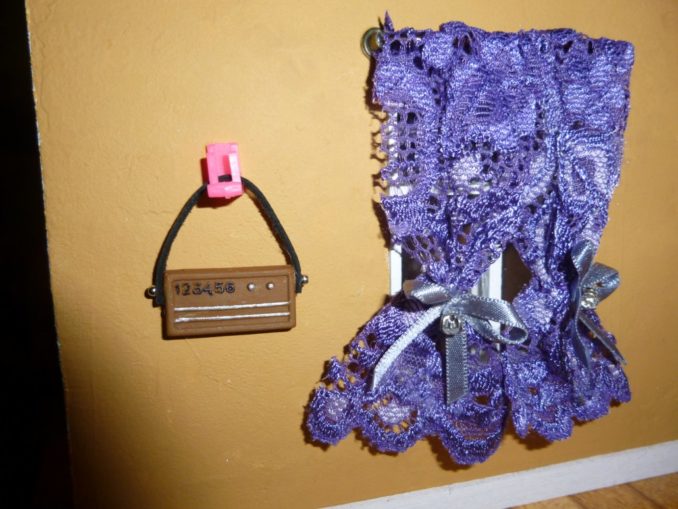
On his way back from the pub that same evening, Rodion noticed a tiny flower shop he must have passed hundreds of times before. As he walked inside, his eyes fell on minute bouquets of forget-me-nots in a galvanised bucket and thought to himself that they were the exact same colour as Sonya’s eyes. Because Sonya had two eyes, Rodion, who at heart was still a child, bought two bouquets which he carried home shyly one in each hand.
“Oh, Rodion, those are lovely!” Sonya exclaimed, taking the flowers out of his hands and putting them in a jar of water. “What are they for? It’s not my birthday…”
“I know it’s not your birthday,” said Rodion, then paused. “It’s the day I ask you to marry me.”
Sonya stared at Rodion with big eyes and remained silent.
“You’re free to say no,” stammered Rodion, already losing his nerve. “I know I’m not…”
“Of course I’m free to say no,” Sonya cut him off; “but I’m not going to.”
Simon Marmeladov was over the Moon at the prospect of coming to London and give his daughter away, all the more than his boss and friend Roger, whom Sonya had met in Exeter, would be there to lend a helping hand. Rodion obtained his transfer, together with a promotion, to the Exeter branch of the supermarket where he stacked shelves. He hesitated for a long time before writing to invite his sister Audrey and her husband to his wedding. Shame about his past held him back. In the end, it was Sonya who convinced him to send Audrey the first letter he had ever written. I must inform my beloved readers that it was long and carefully worded. To his pleasant surprise, Rodion received a congratulation card two days later stating that his sister and brother-in-law would attend the ceremony.
Sonya’s boss was sorry to lose such a trusted employee, but at the same time proud to be the clergyman who would celebrate the wedding. His wife, a kind soul with a soft spot for Sonya, presented her with a brand new copy of the Children’s Bible, for that was what it had been all along, which had so impressed her and changed her life for the better. During their engagement, Rodion and Sonya started attending Jason’s Bible classes. Rodion also consulted an ophthalmologist and was fitted with proper glasses.
Our story should end happily ever after at this point; but it does not, for our friend Roger the publican, about a month before the wedding, had the misfortune to encounter the wrong-doer called Dasia whom my esteemed reader met in the last instalment of this magnificent saga; and Dasia being the miscreant she was, in no time convinced Roger to join the ranks of British dissidents.
Just three weeks before Rodion and Sonya’s wedding, he called Simon into his office and began thus:
“Si, I know you’re not going to like this, but, trust me, this is really good news. I’m selling the pub and moving to the Andrei Sakharov dissidents’ campsite. And I want to take you with me.”
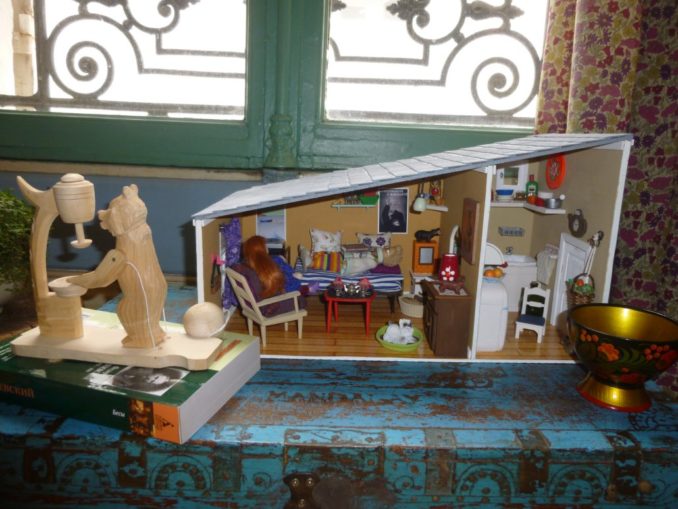
“But Rog,” Simon faltered, “you know my little girl is getting married at the end of this month. Her husband to be has redeemed himself through hard work and seems solid, but still I ‘d like to be nearby to make sure they’re alright. I’ve been a rotten father; it’s the least I can do.”
“I know you want to make amends to Sonya, Si,” said Roger, “and I respect you for it, but the campsite isn’t exactly miles away, just outside Barnstaple in fact, you’ll be able to see them every weekend.
“The thing is, that lot at the campsite bought a sixteenth century inn which was about to be turned into an Islamic cultural centre, that is a den of terrorist iniquity and child rape, and moved every last piece of timber to the campsite. They have a mistress carpenter there called Savannah who oversaw the whole process. Let me tell you, Si, it’s a magnificent building and they’ve asked yours truly of all people to be their publican. When you see the room I’ve set aside for you, you just won’t be able to resist. The pub is massive with a honeymoon suite so glorious I hope your daughter and son-in-law will decide to spend their honeymoon there. Part of the building will be a public library, those dissidents are a cultured lot, and Mrs. Cohen who lives at the campsite has volunteered to run it.”
“Is she Jewish?” asked Simon stupidly.
“I didn’t know you’d joined the Labour Party, Si,” Roger quipped.
“You know me better than that, Rog, and I have nothing against Jews, honest.”
“Her name’s Lucy,” Roger scolded, “and she grew up in the Eastside.”
“Rog,” pleaded Simon, “we’d arranged that my little girl and her husband would live here at the pub, at least at the beginning…”
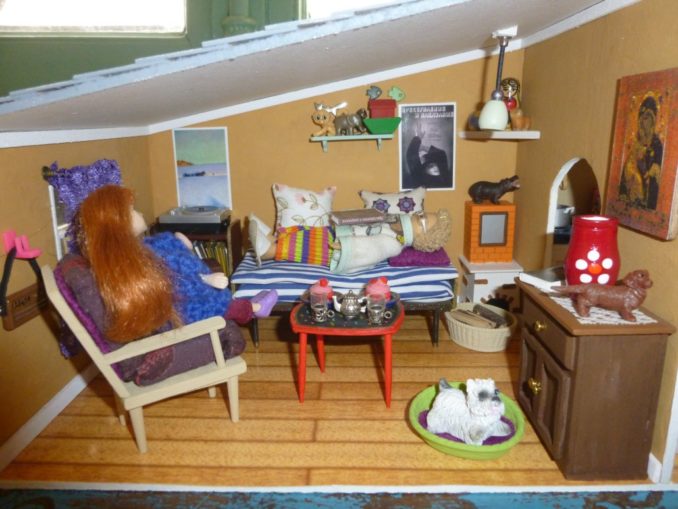
“I’m your friend, Si,” said Roger. “I’m not about to let you or your family down. I called Dasia who’s an old girl who seems to be running the whole dissident show behind the scenes. She said that an old boy who lived in the Aleksander Zinoviev Building has just passed away. That’s another place dissidents have bought, by the way. His small flat at the top is now free. Next time they come here, Sonya and Rodion can go and view it. If they like it, it’s theirs. They won’t b able to meet Dasia, though. For some reason, she’s gone to Chernobyl of all places.”
“But will it be safe for them living there?” worried Simon. “I’ve told you my son-in-law used to be with Antifart and they’re a bunch of terrorists. What if they come after him?”
“Si, they’ll be safer there than where they are now, safer even than they’d be living here with you and me. Dissidents’ groups are all about solidarity. Looking out for one another is what they do best. Say yes, Si please; I don’t want to lose you. Everyone at the campsite is nice and friendly and dying for a real pub. There’re lots of Greek teachers living there, several are retired. You told me you were keen to learn Greek. I’m sure they’ll be delighted to teach you.”
“Stop right there, Rog,” said Simon. “I’ll write to Sonya after lunch. If they like the flat I’m your man.”
Rodion and Sonya came to Exeter the following weekend. Early on Saturday morning they walked hand in hand to the Aleksander Zinoviev Building which had been designed by a Russian architect at the end of the eighteenth century and had an unmistakable St Petersburg flavour. The elderly porter who led Rodion and Sonya to the top floor in the ancient cage lift was reserved but not unfriendly. Before unlocking the door he warned: “The flat needs refreshing. Absalom couldn’t do much at the end. Ladies here helped, but there was only so much they could do.”
The flat consisted in a small kitchen and a large room with an East-facing window and a fireplace in the corner. The bathroom on the landing was shared. The walls needed repainting and the floorboards scrubbing, but it was a nice place. Although the furniture had been removed, an antique wooden shelf painted aqua had been left hanging on the back wall. Sonya gazed at it and suddenly felt as if she were floating.
“I love it!” she said to no one in particular.
The two weeks Rodion and Sonya spent at the Andrei Sakharov campsite were the happiest in their life (so far). They immediately became friends with everyone (it was several years before Dasia thought of importing KGB agents). Unbeknownst to Rodion and Sonya an event of transnational importance had occured at the campsite: Gideon’s dog Marius had become a father. But unlike Leroy, the rap music enthusiast who so tormented Rosie before she became Mrs. Gideon, Marius had had all his children with just one female dog. So, before they left for their new home, one of the puppies was presented to the newlyweds to Sonya’s absolute delight.
While she was in Chernobyl, Dasia had left her Mini at the campsite. Her friends were allowed to use it provided they drove carefully. The inhabitants were so sorry to see Rodion and Sonya leave that they decided to accompany them to their new flat in Dasia’s Mini. Roger drove, Rosie sat in Gideon’s lap on the front passenger seat, Mrs. Cohen sat in Mr Cohen’s lap on the back seat next to Simon holding Marius, Rodion with his wife in his lap were crushed in the corner. Selina and Savannah followed on Gideon’s scooter. The British police could have arrested a Mini-ful of wrong-thinkers in one swoop, but they were too busy monitoring Farce-Book, Bitter and Wickedpedia for hate speech.
It was now April, nighttime but not late. Rodion changed into his pyjamas and looked at his wife already asleep, at their flat so tidy so clean, at the postcard of a Greek church which his father-in-law had sent them promising many more, and wondered how a man who led such a steady, orderly life could have once lived in a filthy squat and above all belonged to such a foul organisation as Antifart. Rodion shook his head in disbelief and got into bed next to Sonya. Then he picked up his wife’s Bible off the table and started reading Exodus.
© text & images Doxie 2020
The Goodnight Vienna Audio file
Audio Player



